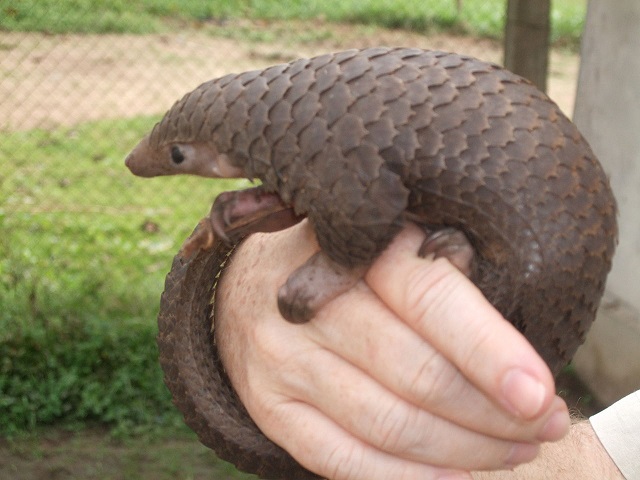Rats Trained for Illegal Wildlife Trade
Africa's giant rats have been trained to sniff out landmines and detect tuberculosis in humans, and soon they could turn their superior noses to protecting other animals by finding illegal wildlife trophies being smuggled out of African ports.
The U.S. Fish and Wildlife Services-financed project is still in its early stages - the rats who will be trained to scuttle over shipping containers in search of pangolin scales were only born in October.
But the aim is to prove by late 2017 that their powerful sense of smell can distinguish the illegally traded items even if they are stashed in coffee or other scent-masking substances in containers before they are loaded onto ships for export.
"I firmly believe that we are going to be able to prove that they can," said Kirsty Brebner, whose organization Endangered Wildlife Trust had the idea of putting rats to work on the illegal wildlife trade.
"They are clearly trainable, they clearly have a strong sense of smell," Brebner said. She said the eventual aim is to train rats to find ivory and rhino horns, too.
Pangolins, a mammal hunted close to extinction for the unique scales on its body, which find a ready market in Asia, are the first target because they have a stronger scent than ivory or rhino horn, giving the rats a better chance of success.
The rats will be tested and trained by APOPO, a Tanzanian-based group that pioneered using the African Giant Pouched Rat to find landmines. Harnessed to wires, the rats scamper along and are rewarded by a handler if they find a buried device.
After that success, the rats have also been trained to detect sufferers of tuberculosis by sniffing sputum.
For the wildlife project, APOPO's James Pursey said, the rats would first be trained to sniff out a substance in return for a reward. Then they would be taught to discriminate pangolins from other smells, a process likely to last until mid-July.
"We will then be developing the optimal method for how to actually test the shipping containers," Pursey said. If that succeeds, the project could be rolled out from late 2017.

The giant rats have been chosen for these projects for their longevity - they live as long as eight years, so there is a better return on the training investment - and they don't bond easily with handlers, so they will adapt to whoever uses them, Brebner said.
The Endangered Wildlife Trust has long used dogs to trace wildlife trophies, but rats can scramble into small, dark places and could climb up containers, Brebner said.
The authorities in Tanzania, a nation that boasts the sweeping wildlife-filled plains of the Serengeti but is struggling to fight poaching, have supported the project.
Dar es Salaam and other East African ports often announce seizures of poached items, but experts say more evade detection and make it to markets mainly in Asia, threatening populations of pangolins, elephants, rhinos and other African species.
Currently, contraband, particularly when smuggled in large volumes, is often transported from Africa in shipping containers. This presents a particularly challenging environment for law enforcement officials at ports. The sheer volume of cargo going through ports makes scanning every container using X-ray scanners virtually impossible, and X-ray techniques are unable to differentiate between different types of organic material.
Dogs have been successfully used to detect wildlife contraband, and have been used for shipping containers. However, the fact that shipping containers are sealed, and only provide limited scent to the dogs, creates a challenging environment for detection. The use of a remote air sampling system, where air from a container is sucked onto a filter which is then presented to a dog to determine if contraband is present, has been used successfully.

that matters most
Get the latest maritime news delivered to your inbox daily.
African pangolin.

